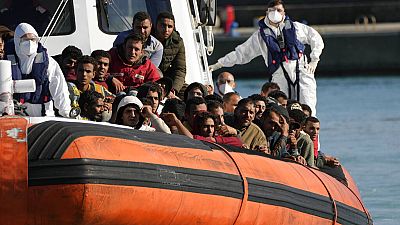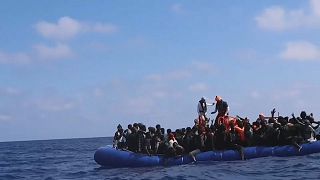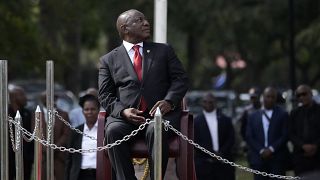Egypt
Fleeing poverty and repression, with no plans for the future, more and more Egyptians are trying to reach Europe, often risking their lives like the dozens caught in the recent shipwreck in Greece.
"I spoke to my son for the last time on the evening of 7 June: he told me he was leaving" two days later, told AFP the father of a 14-year-old boy who disappeared when a dilapidated and overloaded trawler sank off the Peloponnese on the night of 13-14 June.
"In our village, young people regularly leave without telling their families, and that's what happened to us: I learned that my son had gone (...) to Libya, where he stayed for 15 days before setting sail", continued the man, who refused to give his name.
In the village of Naamna in the Nile Delta alone, the NGO Refugees Platform in Egypt (RPE) has recorded 13 missing persons, including nine minors.
According to the authorities, 43 Egyptians survived. RPE, for its part, has received dozens of calls from families still without news. In two villages in the province of al-Sharqiya alone, there were more than forty families.
So far, 82 bodies have been recovered from the waters following this shipwreck, probably one of the worst in the Mediterranean. However, according to the UN, between 400 and 750 passengers were on board the trawler, including women and children.
"We don't know how many Egyptians were on board and the authorities have not announced the number of missing Egyptians," Nour Khalil, director of RPE, told AFP.
Only a talk-show host close to the regime ventured to give a figure: according to him, 200 Egyptians were on board.
The father of the young man who disappeared is still waiting for news.
"We went to the Ministry of Foreign Affairs to take a DNA sample", he told AFP. But "we don't know anything and nobody is keeping us informed".
- A third of unaccompanied minors -
Between January and May, Frontex, the European border agency, recorded 50,300 arrivals of migrants in Europe via the central Mediterranean, the most dangerous migratory route in the world. Others have undoubtedly landed but have not been spotted.
In 2022, one in five migrants arriving in Italy was Egyptian, according to the European Union Asylum Agency (EUAA). According to Rome, Egyptians are the largest group of arrivals in Italy, accounting for a third of all unaccompanied minors.
Most of them, adds the EUAA, are trying to reach Italy from Libya to escape the worst economic crisis in Egypt's history, but also the "human rights situation" -- "catastrophic" under President Abdel Fattah al-Sissi, according to the NGOs.
Cairo regularly presents itself as an anti-illegal immigration champion, demanding ever more funds from the Europeans.
In June, French President Emmanuel Macron hailed "an essential partner of the European Union in the fight against illegal immigration", according to the Egyptian Presidency.
Since 2016, no migrant boats have left the Egyptian coast. In August 2022, the European Commission announced that it would provide Egypt with a further 80 million euros, in particular to finance "the surveillance of land and sea borders".
- No future" -
But for Mr Khalil, "the militarisation of the borders is not a solution", it has merely "shifted the problem", as Egyptians are now taking to the sea from Libya.
In Libya, the UN regularly denounces the "massive arbitrary detentions" of "thousands of migrant men, women and children rounded up in the streets or in their homes".
At the beginning of June, Libyan media even relayed unauthenticated videos showing nearly a thousand Egyptians being expelled and forced to cross the border on foot.
"The penalties for smugglers are increasingly severe, the coastguards are increasingly armed" and NGOs have no access to these militarised areas, says Mr Khalil.
But all these barriers have not stopped the 13 Egyptians from the Naamna village from leaving, because "as long as the new generation has no prospects for the future and no opportunity to make its voice heard", the departures will continue, he asserts.
Nine of them were under 18 because the profile of Egyptian migrants has changed.
"Before, they used to go to Europe to work for a few years, save up and return to Egypt to set up a small business," explains Mr Khalil.
Today, "the new generation doesn't want to come back to Egypt because they think they have no future there".












Go to video
British police charge two men after Channel migrant deaths
Go to video
Namibia: Tourists pose naked at Big Daddy Dune in Namib Desert, Govt expresses anger
01:02
Pics of the day: April 25, 2024
01:09
Tanzania: Death toll from flooding rises to 155 as heavy rains continue in Eastern Africa
Go to video
Kenyan government recommends regulating, not banning TikTok
Go to video
Over 100 inmates break free from a Nigerian prison after heavy rains